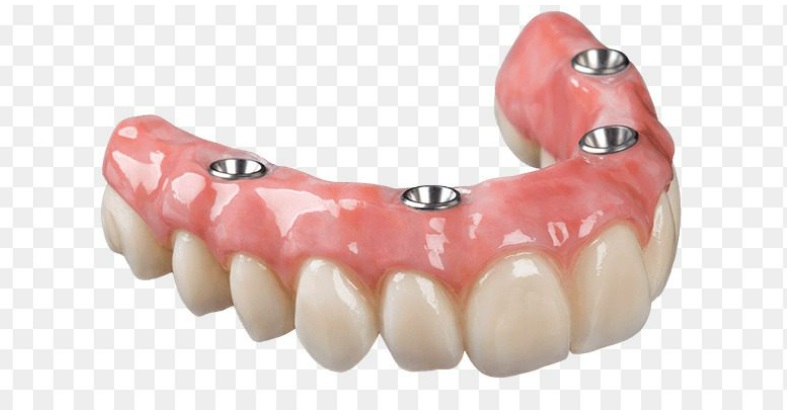
Complete (total) dentures
These are the prostheses that we apply to completely edentulous mouths where all teeth are extracted. Due to the lack of teeth, the cheeks collapsed, the jaws approached, and the face took on an aged appearance. The patient cannot eat and has both health and social problems. With the construction of the prosthesis, the patient can easily maintain his social life as well as his nutrition.
Full dentures are made of gingival-like pink resins, which we call acrylic. This base covers the jaw bones, which we call the alveolar crest, as widely as possible. Although this width seems to cause a problem for the patient at first, it is easily accepted by the patient in a short time.
How do full dentures stay in the mouth?
Full dentures hold with the adhesion force created by the saliva between the prosthesis and the tissue. This is similar to the adhesion force created by water between two glasses. In addition, the placement of the prosthesis on the retaining areas in the tissues also increases the retention.
The thinness of the bone on which the lower prosthesis rests is the most important factor reducing the retention. However, the most important factor affecting retention in the lower jaw is the tongue. The movement of the tongue causes dislocation of the prosthesis and deterioration of the adhesion force we mentioned.
Another important factor in the retention of the prosthesis is the full fit of the lips and cheeks to the edges of the prosthesis, which positively affects the retention.
Do full dentures cause speech disorders?
If full dentures are made properly, they do not cause any defect. However, there may be difficulty in speaking when first inserted, which will resolve in a few days. By reading aloud books, newspapers, etc., speech problems can be easily solved. The important thing here is not to insist on trying to say difficult words correctly. This can always cause the word to be mispronounced.
When can I eat with my full denture?
It is very difficult to eat in the first days with full dentures. Definitely, very hard foods and big bites should not be preferred.
Do total dentures affect taste?
The sense of taste is completely related to the tongue. The palate has nothing to do with taste.
How should the tooth selection be in total dentures?
Total dentures patients often want small white teeth. Especially small teeth are not very aesthetically pleasing in total dentures. A photograph of the patient’s teeth before they become edentulous will help the dentist in the selection of teeth. Although there is no photograph, the size and shape of the teeth are determined according to the various proportions on the face. The color of the teeth is decided together with the doctor and the patient.
What can be encountered after the prosthesis is inserted?
Batting
Cheek
Biting Joint
Pain
Speech Disorders